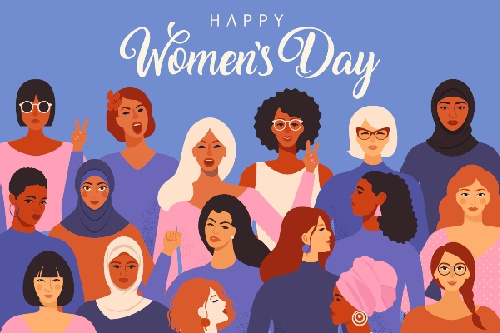
Statement by Phumzile Mlambo-Ngcuka, UN Women Executive Director, on the International Women’s Day 文章源自英文巴士-https://www.en84.com/10922.html
联合国妇女署执行主任普姆齐莱·姆兰博-恩格库卡在国际妇女节的声明文章源自英文巴士-https://www.en84.com/10922.html
文章源自英文巴士-https://www.en84.com/10922.html
Change up the pace: women at the table文章源自英文巴士-https://www.en84.com/10922.html
加快步伐:妇女代表权文章源自英文巴士-https://www.en84.com/10922.html
文章源自英文巴士-https://www.en84.com/10922.html
March 8, 2021文章源自英文巴士-https://www.en84.com/10922.html
2021年3月8日文章源自英文巴士-https://www.en84.com/10922.html
文章源自英文巴士-https://www.en84.com/10922.html
International Women’s Day this year comes at a difficult time for the world and for gender equality, but at a perfect moment to fight for transformative action and to salute women and young people for their relentless drive for gender equality and human rights. Our focus is on women’s leadership and on ramping up representation in all the areas where decisions are made - currently mainly by men - about the issues that affect women’s lives. The universal and catastrophic lack of representation of women’s interests has gone on too long.文章源自英文巴士-https://www.en84.com/10922.html
今年的国际妇女节既是整个世界和性别平等工作面临的困难时期,又是争取变革行动、向不懈推动性别平等和人权的妇女和年轻人致敬的完美时刻。我们的重点是妇女的领导力,以及在各个领域中提高妇女的代表性,而目前在这些领域中,影响妇女生活的问题决策主要由男性主导。妇女权益代表性的普遍缺乏以及由此造成的严重后果由来已久。
As we address the extraordinary hardship that COVID-19 has brought to millions of women and girls and their communities, we also look ahead to the solid opportunities of the Generation Equality Forum and Action Coalitions to bring change.
当我们应对新冠肺炎疫情给数百万妇女和女孩及其社区带来的巨大困难时,我们也期待着“平等的一代”论坛和行动联盟即将带来变革的坚实契机。
During the pandemic, we have seen increased violence against women and girls and lost learning for girls as school drop-out rates, care responsibilities and child marriages rise. We are seeing tens of millions more women plunge into extreme poverty, as they lose their jobs at a higher rate than men, and pay the price for a lack of digital access and skills. These and many other problems cannot be left to men alone to solve. Yet, while there are notable exceptions, in most countries there is simply not the critical mass of women in decision-making and leadership positions to ensure that these issues are tabled and dealt with effectively and this has affected the pace of change for women overall.
在疫情期间,随着辍学率、照护责任和童婚数量攀升,我们看到暴力侵害妇女和女孩的行为增加,女孩失去受教育机会。我们看到几千万妇女陷入极端贫困,因为她们比男性失去工作的几率更高,为缺乏数字化通路和技能而付出代价。这些问题和许多其他的问题都不能单独由男性来解决。然而,虽然也有明显的例外,但在大多数国家,在决策和领导职位上根本没有足够数量的女性代表来确保提出并有效处理这些问题,这影响了妇女变革的整体速度。
There are breakthroughs to celebrate, where women have taken the helm of organizations such as the World Trade Organization, the International Monetary Fund and the European Central Bank and we look forward to more such appointments that help to change the picture of what a leader looks like. Yet this is not the norm. In 2020, as a global average, women were 4.4 per cent of CEOs, occupied just 16.9 per cent of board seats, made up only 25 per cent of national parliamentarians, and just 13 per cent of peace negotiators. Only 22 countries currently have a woman as Head of State or Government and 119 have never experienced this – something that has important consequences for the aspirations of girls growing up. On the current trajectory, we won’t see gender parity in the highest office before 2150.
当然也有值得庆祝的突破,例如,妇女已经掌握世贸组织、国际货币基金组织和欧洲央行等组织的领导权,我们期待更多这样的任命,以帮助改变民众对领导者形象的认知。但这并未成为常态。在2020年,按全球平均水平计算,妇女占首席执行官群体的比例为4.4%,仅占董事会席位的16.9%,仅占国家议员群体的25%,仅占和平谈判官群体的13%。目前只有22个国家曾有妇女担任国家元首或政府首脑,119个国家从未有过这种情况,这对女孩成长的志向产生了重要影响。根据目前的趋势,我们在2150年之前无法看到最高职位层级的性别均等。
This can and must change. What is needed is the political will to actively and intentionally support women’s representation. Leaders can set and meet parity targets, including through appointments for all executive positions at all levels of government, as has occurred in the few countries with gender equal cabinets. Special measures can work; where countries have put in place and enforced quotas, they have made real progress on women’s leadership, as have those that have policies to address representation. Where these measures do not exist, progress is slower or even nonexistent and easily reversed.
这种情况能够并且必须改变。我们需要的是积极且特意支持妇女代表权的政治意愿。领导人可以制定并实施性别均等的目标,包括通过在各级政府的所有行政职位任命妇女,全球少数几个在内阁实现性别平等的国家就采取了这种做法。特别措施也可发挥作用;某些国家通过建立并执行性别配额,在妇女领导力方面取得了实质进展,还有一些国家通过政策解决妇女代表权问题。而在缺乏这类措施的国家,进展较为缓慢甚至停滞不前,又或是很容易出现逆转。
No country prospers without the engagement of women. We need women’s representation that reflects all women and girls in all their diversity and abilities, and across all cultural, social, economic and political situations. This is the only way we will get real societal change that incorporates women in decision-making as equals and benefits us all.
没有妇女的参与,任何国家都无法实现繁荣。我们需要妇女代表,反映所有妇女和女孩的多样性和能力,以及所有文化、社会、经济和政治状况。这是我们真正实现社会变革的唯一途径,使妇女平等参与决策,并使我们所有人受益。
This is the vision of the 2030 Agenda and the Sustainable Development Goals and the vision of the Beijing Declaration and Platform for Action. It is the vision of civil society and multitudes of young people who are already leading the way and of all those who will join us in the Generation Equality Action Coalitions. We need bold decisive action across the world to bring women into the heart of the decision-making spaces in large numbers and as full partners, so that we can make immediate progress on a greener, equitable and inclusive world.
这是《2030年议程》和可持续发展目标的愿景,也是《北京宣言和行动纲要》的愿景。这也是众多带头的民间团体和青年的愿景,也是所有将加入我们“平等的一代”行动联盟的有志之士的愿景。我们需要在世界各地采取大胆、果断的行动,使大量女性作为全面合作伙伴进入决策领域的中心,这样我们才能在一个更和平、公平和包容的世界取得直接进展。

